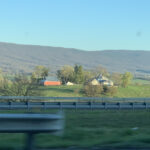My dad recently visited me in Cologne. During his stay, we walked a lot of the city, stopping to gawk at the remnants of old city walls, bizarre German advertising, and buildings, pictures and signage that testified to the city’s near decimation during World War II.
Here’s an instance that repeated itself during our walks: We would approach a street corner, look left and right for approaching traffic, and see nothing. My dad would step cross the street, and I would stay behind, eyes fixed on the red pedestrian light, my feet itching to advance, my brain patiently awaiting the switch to green.
Life as an expat can be categorized according to two phenomena: experiences that reinforce the expat’s sense of belonging to her heritage and experiences that point to a shift in identity: spurred by the change in environment, a step toward something new. Trips to the German supermarket, with the cut-throat but efficient bag-your-own groceries impetus at the cash register, remind me that I’ll always feel most at home in the customer-friendly United States. But long visits in German restaurants, where one dines unpressured by an overzealous wait staff, are a welcome change of pace from the sometimes utilitarian, fast-casual American restaurant milieu.
The German crosswalk is where these two poles collide. My American heritage—represented in this instance quite neatly by my dad—was already halfway across the street, bearing little mind to the illuminated red stick figure. My learned German impulses, however, had my feet planted on the sidewalk and my head mindful of my civic duty—in this case to adhere to pedestrian ordinance and remain stationary until the red stick figure went green.
I’ve known American street-crossing to resemble the video game Frogger, in which a frantic amphibian springs forwards, backwards, left and right to dodge oncoming traffic and eventually reach the other side before getting splayed across the windshield of a Honda CR-V. My guess is that most Americans who have spent any time wandering even a mid-sized city have played the role of the frog.
The German on the other hand, pauses at an intersection, deferring to the wisdom of the system and immediately understanding that her halt is for the greater good: unimpeded roads for commuters means efficiency in the workforce which means reliability in the economy which means stability in the global political order which means prosperity for her great-grandchildren, etc. Even in Cologne, a city regarded as tolerant and lax when it comes to social norms, unsanctioned street-crossing can result in a wrist slap, if not a fine.
“Köln steht bei rot.” Cologne stands during red.
This is the theme of an ad campaign in the city right now. Two men, adorned and painted entirely in red and green, obliging passersby not to jaywalk. Their posters hang on street corners and in subway stations. They march in city parades. It is important to note that the traffic lights are turned off during parades.
It’s admirable that the German approach assigns such significance to what most Americans probably understand to be a minor issue. Perhaps there’s some broken-windows research supporting the German grandmother’s theory that pedestrian adherence to traffic lights result in geopolitical stability and economic flourishing.
But there’s at least equal merit in the American perspective. It’s a perspective that tells you to clench your jaw and summon some conviction, even when facing four lanes of traffic and an imposing red light.
German author Heinrich Böll is one of Cologne’s native sons. He grew up in the city and spoke (sometimes critically) of the city’s patchwork development after being left in ruins following the war. There were subway stations, plenty of disparate ad campaigns and expansive construction projects. In 1982 he moved out of the city because he had difficulty walking.
Year’s after his uncle’s death, Böll’s nephew was asked if Heinrich Böll would still live in Cologne were he alive today. Probably not, he said.
“When it becomes difficult to cross the street, then it’s time to leave the city.”
I like the way his answer speaks to the expat’s pedestrian dilemma: when to stay, when to go. It’s laced with pragmatism, a sober understanding of one’s own limitations and surroundings. What more is an expat than an ambler looking for the right time to cross?

Andrew Knot (’11) lives and writes in Cologne, Germany.








